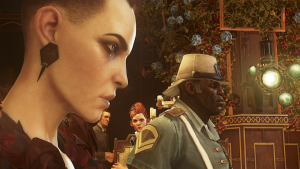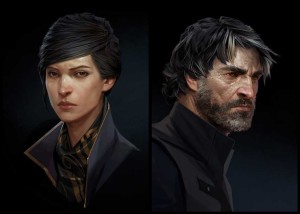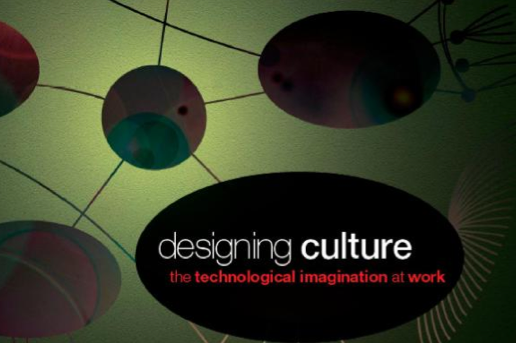Work on Dishonored 2 took time, such time that there’s no chance of the story purposefully mimicking too much of what’s happening in the world now, but then again, the story of what’s happening in the world now is an old one, a repeated cycle of suffering, the haves not just triumphing over the have-nots, but grinding them slowly under their bootheels. Grinding them slowly to nothing.
But Dishonored 2 is—or can be—a story of redemption. Emily, stripped of her birthright, her gold, her protection, ventures out not for a moonlit jaunt, but to slip through the streets in search of justice, and along the way, her eyes are opened to the suffering of the people of the Empire, a suffering that can be laid at her feet.
Or you could just kill everyone. That, too, is an option; slaughter your way through Karnaca and rise again as Emily the Butcher, strong, perhaps, ruling from on high, but on a foundation of bodies that will turn one day to dust.
It’s difficult to redeem Emily the Unconcerned, which is who she seems to have been before the events of the coup. Perhaps more accurately Emily the Uncomfortable, who wants to do right by her people, but dislikes the pageantry, the ceremony, the restrictions, and yes, perhaps some of the responsibility. Doing right is hard, after all; she’d rather gallivant around with her father. And I don’t blame her; I too would probably much prefer running around on rooftops. But this isn’t why it’s hard to really buy into Emily’s arc as a redemption arc; it’s because, despite all the trappings, all the moments of reflection, when Emily is face to face with what her own life of privilege has cost the people of the Empire, in order to reclaim the throne, you’re still causing suffering. At least, I am. I steal. I meddle. Sometimes I break things, and perhaps, like Delilah, like her mother, it’s the servants who’ll be blamed.
Chaos. Low chaos, but still I leave destruction in my wake, and tell myself it’s worth it. That this is the cost of learning, of reclamation.
I’m sure it’s possible to play through without stealing anything, without leaving so much as a ripple behind, just as you can choose to reject powers. But how much harder to ignore the pearl fans and silver snuff boxes?
Maybe there’s a lesson in that, too.
 What of Delilah? Almost, I want to shift my allegiance to her. Why should Emily, also a child born out of wedlock, be any more favored than Delilah? What has Emily earned? The answer, of course, is nothing, at least before the game; after, it’s everything. She’s earned everything. But imagine the bitterness in Delilah: a mother discarded like a piece of tissue, left to rot and die while the other daughter dressed well, ate well, and grew up pampered? This is the system: the haves, well, have. Everyone else gets a too-small coffin and should be grateful for it.
What of Delilah? Almost, I want to shift my allegiance to her. Why should Emily, also a child born out of wedlock, be any more favored than Delilah? What has Emily earned? The answer, of course, is nothing, at least before the game; after, it’s everything. She’s earned everything. But imagine the bitterness in Delilah: a mother discarded like a piece of tissue, left to rot and die while the other daughter dressed well, ate well, and grew up pampered? This is the system: the haves, well, have. Everyone else gets a too-small coffin and should be grateful for it.
Delilah should be an American icon, a woman who grabbed hold of her bootstraps and pulled like no one had pulled before. Through skill and cunning, she rose; that her skill was in magic and darkness makes it no less difficult. She worked, dying for her goals and demanding resurrection.
And then she killed everyone, of course, because the whole bootstraps thing might as well be a myth and anyway, the Empire doesn’t draw its inspiration from America, but from the great colonial British empire, and compared to monarchs and royals and rich, regal bloodlines, baseborn brats like Delilah are born to cunning and evil, right?
Except it wasn’t just her birth, obviously, because Delilah is surrounded by people of all sorts who are just as willing to kill or harm anyone who stands in their way. She and Breanna Ashworth and the other witches want desperately to have a freedom that even women in the Empire, women who wear trousers and who are allowed to reign, aren’t freely given. They take it through magic and blood and trickery; that, too, is the nature of women in stories. We turn to magic. It’s the feminine mystique, turned back, weaponized. Kirin Jindosh is a genius, and thus entitled to everything he’d like; he deserves it all, in the name of science, for the altar of his research. Luca Abele is just vicious, irredeemable, and has been since childhood. A product of his privilege? Who knows.
Would they be heroes, if the game told us they were?
 I’m nearly finished with my second playthrough, this time with no deaths. My husband is playing through as Corvo, on high chaos. Many of the interactions are the same. Was this a way to save money on development, or is that, too, a lesson?
I’m nearly finished with my second playthrough, this time with no deaths. My husband is playing through as Corvo, on high chaos. Many of the interactions are the same. Was this a way to save money on development, or is that, too, a lesson?
If the latter, it’s a dark lesson indeed.
If the Empire of the Isles had an EPA, Delilah might have demanded the names of those working on climate issues. Might cut into profit, you know. Delilah wants money, power, to be worshipped, loved. She is a narcissist. Too close to reality. But our narcissists don’t kill loyal members of the prior regime, at least. Not openly. Not here. Not yet. We punch down.
Emily, ruminating on Duke Abele, on the ruin of the Dust District and the plight of the miners, says the Duke probably didn’t care so long as he had his silver cups. Anton Sokolov doesn’t spare her feelings; he asks about the cups in Dunwall. About Emily herself. And she hears it, my Emily. She knows that she will be someone else when she reclaims her throne, that she will do more, be more, for her people. To lift them up.
I am reminded again, that this is a fantasy. That there is no way to strip our leaders of privilege and dump them into the streets to survive, to reclaim, to fight, to learn. We cannot take their jets, their fancy dinners, their protection. We lower their salaries; they award themselves bonuses. What do they know of our lives? President GW Bush was amazed by a grocery scanner. Every so often, someone suggests we do away with food stamps; this is the updated version of “let them eat cake,” which wasn’t so much Marie Antoinette (debunked) as it was generations of rulers blinking with confusion, utterly unable to comprehend lives not like their own.
We traded in royalty and got something else in return, but the CEOs, the university presidents, the politicians, they’re often just as separated.
In the Dust District, if you don’t save Aramis Stilton, you can give control of the region to the thugs or the Abbey. The Howlers sometimes help the poor, but they prey as well. The Overseers only seem to oversee hate and oppression. I couldn’t find any good in them. There are no good choices. Even Stilton, who knows? He fell in with the wrong people once. Every option must be weighed. You take the lesser of all the evils, and you hope.
I played Dishonored much as I’m playing this one: low chaos at first, with some deaths, with subsequent plays dedicated to harming less and sneaking more. But if you start as Corvo, everything reminds you of destruction during the rat plague. Death. The assumption is that you were a butcher, a murderer, cutting wantonly through Dunwall. This is jarring. It’s part of why I’ve only gone forward with Emily. But this, too, is a lesson. Games assume we will kill. We will do what’s convenient. We will drag bodies through the air and laugh as we stab guards in the neck. So many games are built around butchery.
But we don’t have to be butchers. We too can be redeemed.




